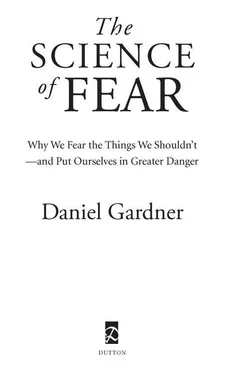Daniel Gardner - The Science of Fear
Здесь есть возможность читать онлайн «Daniel Gardner - The Science of Fear» весь текст электронной книги совершенно бесплатно (целиком полную версию без сокращений). В некоторых случаях можно слушать аудио, скачать через торрент в формате fb2 и присутствует краткое содержание. ISBN: , Издательство: Penguin Group (USA) Incorporated, Жанр: Психология, Политика, Прочая научная литература, на английском языке. Описание произведения, (предисловие) а так же отзывы посетителей доступны на портале библиотеки ЛибКат.
- Название:The Science of Fear
- Автор:
- Издательство:Penguin Group (USA) Incorporated
- Жанр:
- Год:неизвестен
- ISBN:9780525950622
- Рейтинг книги:3 / 5. Голосов: 1
-
Избранное:Добавить в избранное
- Отзывы:
-
Ваша оценка:
- 60
- 1
- 2
- 3
- 4
- 5
The Science of Fear: краткое содержание, описание и аннотация
Предлагаем к чтению аннотацию, описание, краткое содержание или предисловие (зависит от того, что написал сам автор книги «The Science of Fear»). Если вы не нашли необходимую информацию о книге — напишите в комментариях, мы постараемся отыскать её.
The Science of Fear — читать онлайн бесплатно полную книгу (весь текст) целиком
Ниже представлен текст книги, разбитый по страницам. Система сохранения места последней прочитанной страницы, позволяет с удобством читать онлайн бесплатно книгу «The Science of Fear», без необходимости каждый раз заново искать на чём Вы остановились. Поставьте закладку, и сможете в любой момент перейти на страницу, на которой закончили чтение.
Интервал:
Закладка:
But Gut doesn’t process this information logically. Guided by the Rule of Typical Things, it latches onto plausible details and uses them to judge the likelihood of the whole scenario coming true. As a result, Kahneman and Tversky wrote, “a detailed scenario consisting of causally linked and representative events may appear more probable than a subset of those events.” Add details, pile up predictions, construct elaborate scenarios. Logic says the more you go in this direction, the less likely it is that your forecast will prove accurate. But for most people, Gut is far more persuasive than mere logic.
Kahneman and Tversky realized what this meant for expert predictions. “This effect contributes to the appeal of scenarios and the illusory insight that they often provide,” they wrote. “A political analyst can improve scenarios by adding plausible causes and representative consequences. As Pooh-Bah in The Mikado explains, such additions provide ‘corroborative details intended to give artistic verisimilitude to an otherwise bald and unconvincing narrative.’ ”
Does this matter? In most cases, no. Much of the pundits’ futurology may be as inaccurate as the horoscopes that appear on a different page of the newspaper, but it is no more important. Occasionally, though, what opinion leaders are saying about the future does matter—as it did in the months prior to the 2003 invasion of Iraq—and in those moments Gut’s vulnerability to a well-told tale can have very serious consequences.
THE EXAMPLE RULE
When a roulette wheel spins and the ball drops, the outcome is entirely random. On any spin, the ball could land on any number, black or red. The odds never change.
Tectonic plates are not roulette wheels and earthquakes are not random events. Heat generated by the earth’s core relentlessly pushes the plates toward the surface. The motion of the plates—grinding against each other— is stopped by friction, so the pressure from below steadily grows until the plates shudder and lurch forward in the violent moment we experience as an earthquake. With the pressure released, the violence stops and the cycle begins again.
For those whose bedrooms are perched atop one of the unfortunate places where tectonic plates meet, these simple facts say something important about the risks being faced. Most important, the risk varies. Unlike the roulette wheel, the chances of an earthquake happening are not the same at all times. They are lowest immediately after an earthquake has happened. They rise as time passes and the pressure builds. And while scientists may not be able to precisely predict when an earthquake is about to happen— not yet, anyway—they do have a pretty good ability to track the rising risk.
Knowing this, there should be an equally clear pattern in sales of earthquake insurance. Since the lowest risk is immediately after an earthquake, that’s when sales should be lowest. As time passes, sales should rise. When scientists start warning about the Big One, sales should soar. But earthquake insurance sales actually follow exactly the opposite pattern. They are highest immediately after an earthquake and they fall steadily as time passes. Now, the first part of that is understandable. Experiencing an earthquake is a frightening way to be reminded that, yes, your house could be flattened. But it’s strange that people let their insurance lapse as time passes. And it’s downright bizarre that people don’t rush to get insurance when scientists issue warnings.
At least, it makes no sense to Head. To Gut, it makes perfect sense. One of Gut’s simplest rules of thumb is that the easier it is to recall examples of something, the more common that something must be. This is the “availability heuristic,” which I call the Example Rule.
Kahneman and Tversky demonstrated the influence of the Example Rule in a typically elegant way. First, they asked a group of students to list as many words as they could think of that fit the form _ _ _ _ _ n _. The students had 60 seconds to work on the problem. The average number of words they came up with was 2.9. Then another group of students was asked to do the same, with the same time limit, for words that fit the form _ _ _ _ ing. This time, the average number of words was 6.4.
Look carefully and it’s obvious there’s something strange here. The first form is just like the second, except the letters “i” and “g” have been dropped. That means any word that fits the second form must fit the first. Therefore, the first form is actually more common. But the second form is much more easily recalled.
Armed with this information, Kahneman and Tversky asked another group of students to think of four pages in a novel. There are about 2,000 words on those four pages, they told students. “How many words would you expect to find that have the form _ _ _ _ ing?” The average estimate was 13.4 words. They then asked another group of students the same question for the form _ _ _ _ _ n _. The average guess was 4.7 words.
This experiment has been repeated in many different forms and the results are always the same: The more easily people are able to think of examples of something, the more common they judge that thing to be.
Note that it is not the examples themselves that influence Gut’s intuitive judgment. It is not even the number of examples that are recalled. It is how easily examples come to mind. In a revealing study, psychologists Alexander Rothman and Norbert Schwarz asked people to list either three or eight behaviors they personally engage in that could increase their chance of getting heart disease. Strangely, those who thought of three risk-boosting behaviors rated their chance of getting heart disease to be higher than those who thought of eight. Logically, it should be the other way around—the longer the list, the greater the risk. So what gives? The explanation lies in the fact—which Rothman and Schwarz knew from earlier testing—that most people find it easy to think of three factors that increase the risk of heart disease but hard to come up with eight. And it is the ease of recall, not the substance of what is recalled, that guides the intuition.
The Rothman and Schwarz study also demonstrated how complex and subtle the interaction of Head and Gut can be. The researchers divided people into two groups: those who had a family history of heart disease and those who didn’t. For those who did not have a family history, the results were as outlined above. But those who did have a family history of heart disease got precisely the opposite results: Those who struggled to come up with eight risk-boosting behaviors they engage in rated their chance of getting heart disease to be higher than those who thought of three examples. Why the different result? People with no family history of heart disease have no particular cause for worry and nothing to base their judgment on, so they are more casual in their judgment and they go with the estimate that Gut comes up with using the Example Rule. But people with a family history of heart disease have a very compelling reason to think hard about this, and when they do, Head tells them that Gut is wrong—that, logically, if you engage in eight risk-boosting behaviors, your risk is higher than if you engage in three such behaviors. A similar study by different researchers—this time quizzing women about the risk of sexual assault—got similar results: Those who did not think the risk was personally relevant went with Gut’s estimate based on the Example Rule, while those who did corrected their intuition and drew a more logical conclusion.
As a rule of thumb for hunter-gatherers walking the African savanna, the Example Rule makes good sense. That’s because the brain culls low-priority memories: If time passes and a memory isn’t used, it is likely to fade. So if you have to think hard to remember that, yes, there was a time when someone got sick after drinking from that pond, chances are it happened quite a while ago and a similar incident hasn’t happened since— making it reasonable to conclude that the water in the pond is safe to drink. But if you instantly recall an example of someone drinking that water and turning green, then it likely happened recently and you should find somewhere else to get a drink. This is how Gut makes use of experience and memory.
Читать дальшеИнтервал:
Закладка:
Похожие книги на «The Science of Fear»
Представляем Вашему вниманию похожие книги на «The Science of Fear» списком для выбора. Мы отобрали схожую по названию и смыслу литературу в надежде предоставить читателям больше вариантов отыскать новые, интересные, ещё непрочитанные произведения.
Обсуждение, отзывы о книге «The Science of Fear» и просто собственные мнения читателей. Оставьте ваши комментарии, напишите, что Вы думаете о произведении, его смысле или главных героях. Укажите что конкретно понравилось, а что нет, и почему Вы так считаете.












